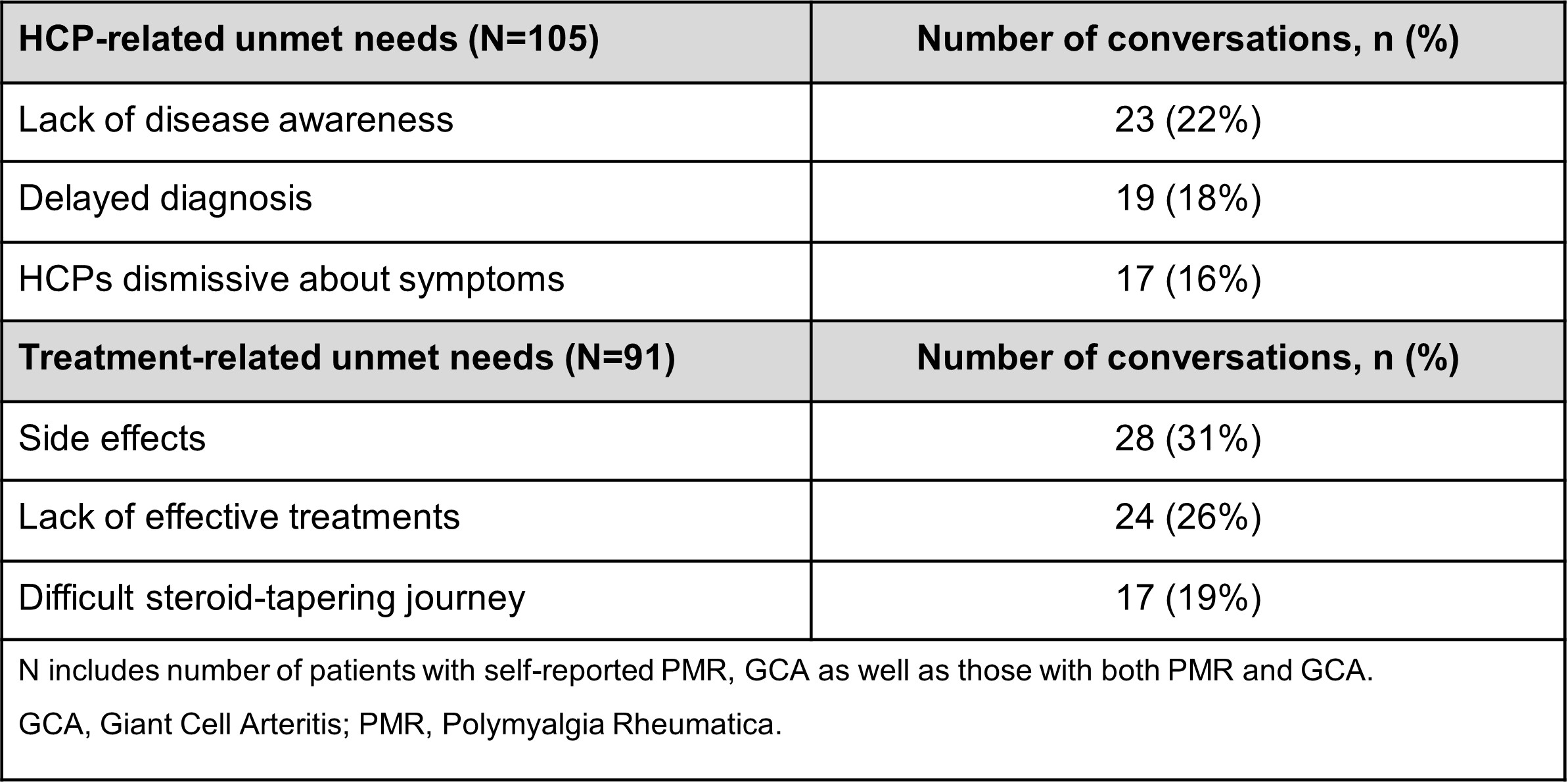Session Information
Session Type: Poster Session C
Session Time: 10:30AM-12:30PM
Background/Purpose: Analyzing social media conversations of patients (pts) and caregivers can be useful to understand the real-world perspectives thereby improving quality of healthcare.1 GCA and PMR are related systemic inflammatory disorders affecting older adults,2 and have a major negative effect on the quality of life (QOL) of pts. We aimed to understand the real-world patient journey and identify the unmet needs of pts with GCA and/or PMR through social media listening (SML).
Methods: Social media content originating from the US and Germany in English and German between Aug 1, 2022, and Aug 1, 2023 were extracted for GCA and PMR. Sprinklr tool was used to download social media posts, using a pre-specified search query. The extracted data were filtered by platforms catering to pts, caregivers and healthcare professionals (HCPs). Duplicate records, broken URLs, news, retweets, and blogs were excluded to obtain insightful data. Natural language processing was used to assess the relevance of posts, followed by manual analysis of filtered data to identify and map key themes and insights.
Results: In total, 21,844 conversations were extracted, of which 1001 filtered posts were manually analyzed. Of the total identifiable reporters (n=517), 90% (n=465) were from the US and mostly females (65%). Among the identifiable reporters, 63% of the conversations were related to PMR, 16% to GCA and 16% related to both GCA and PMR. The most common theme of conversation among pts and caregivers was “treatment” (33%), followed by symptoms (13%), HCP visits (10%), diagnosis (7%) and impact on QOL (7%). The unmet needs and concerns were mostly related to pt experiences with HCPs (perceived lack of disease awareness, delayed diagnosis, and HCPs being dismissive about symptoms) and treatments (side effects, lack of effective treatments, and difficult steroid-tapering journey) (Table). The symptoms of PMR and GCA impacted pts’ physical (n=69) and emotional (n=16) aspects of QOL. Pain (32%) and fatigue (14%) restricted pts with PMR from carrying out daily activities (71%) and caused difficulty in walking (36%). Pts with GCA experienced vision impairment (38%) and fatigue (38%). Sentiment of pts around various treatments (n=297) available for PMR and GCA was negative (61%), mostly driven by side effects/intolerability, inefficacy/waning efficacy and flare-ups during steroid tapering. From the overall responses related to treatment perceptions (n=41), glucocorticoids (GC) had a relatively negative perception (35%), whereas biologics had a more positive perception (27%) and were perceived as a safer alternative by pts. The burden of comorbidities associated with the use of GCs was also a recurrent concern.
Conclusion: To our knowledge, this is the first social media–based study exploring the perspectives of pts with GCA and PMR. The insights from SML reveal that PMR and GCA have a major impact on the QOL and there is a large unmet need for alternative safe and effective treatment options. There is also a need for greater disease awareness among HCPs to aid timely diagnosis and referral.
References:
- Zakkar MA, Lizotte DJ. J Healthc Inform Res. 2021;5(4):382-400.
- Weyand CM, Goronzy JJ. N Engl J Med. 2014;371(1):50-57.
To cite this abstract in AMA style:
Arun P, Parashar N, Sharma S, Arora K, Padmanabhan V, Arjona A. Understanding Unmet Needs and Quality of Life Impact of Giant Cell Arteritis (GCA) and Polymyalgia Rheumatica (PMR) Using Social Media: A Patient and Caregiver Perspective [abstract]. Arthritis Rheumatol. 2024; 76 (suppl 9). https://acrabstracts.org/abstract/understanding-unmet-needs-and-quality-of-life-impact-of-giant-cell-arteritis-gca-and-polymyalgia-rheumatica-pmr-using-social-media-a-patient-and-caregiver-perspective/. Accessed .« Back to ACR Convergence 2024
ACR Meeting Abstracts - https://acrabstracts.org/abstract/understanding-unmet-needs-and-quality-of-life-impact-of-giant-cell-arteritis-gca-and-polymyalgia-rheumatica-pmr-using-social-media-a-patient-and-caregiver-perspective/

